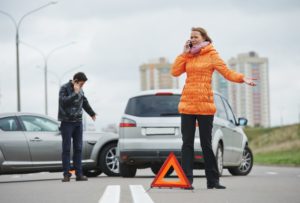
Most people who have been in a car accident were either driving or the passenger of someone they know. But with the rise of ride-sharing apps in recent years, more people are finding themselves involved in a car accident where they neither know the driver nor own the car. If this happens to you, it can be not only frustrating but also confusing. Who is responsible for your car accident doctor bills, and is your insurance involved? Read on to understand what happens if you find yourself in this situation.
Accidents During Ride-Sharing
There are two different scenarios you could find yourself in that involve a rideshare. You may be a passenger during a collision, or you may be involved in an accident with a rideshare vehicle. In both cases, liability will depend on who was at fault for the accident. The same criteria will be used to determine fault. Proof of fault involves three elements:
- The person owed a duty of reasonable care. All drivers have a duty to drive carefully and obey relevant laws.
- The person breached that duty, such as not driving carefully or breaking a law.
- Another party was injured and/or suffered damages due to the other person’s breach.
These criteria do not change based on whether or not drivers are part of a rideshare. However, the way insurance gets involved does differ in that scenario.
Insurance for Rideshare Drivers
A personal auto insurance policy covers most drivers, and when they are involved in an accident, the other party makes a claim against their insurance policy. This policy then reimburses medical expenses and damages. However, these policies have a business-use exclusion, which means that coverage doesn’t apply if the driver uses their vehicle for business purposes. As soon as a driver for a rideshare picks up a customer, their liability insurance and collision insurance is rendered inactive.
To make up for this, major companies like Uber and Lyft provide up to $1 million in liability coverage for each of their drivers. The amount of coverage will depend on the “period” a driver is in. Periods are defined as follows:
Period 0: A driver isn’t logged into their app and is therefore considered to not be working. In this case, personal insurance might apply, but no insurance from Uber or Lyft does.
Period 1: When the driver is logged into the app but has not accepted a ride, liability coverage is available for any accident that the driver is at fault for, up to $50,000 per person and $100,000 total.
Period 2: A driver who has accepted a trip and is en route, but has no passenger in the car, has liability coverage up to $1 million.
Period 3: If a passenger is in the car, the $1 million liability coverage applies, as well as limited coverage for damage to the driver’s car and uninsured motorist coverage.
For the passenger or other party in these crashes, your insurance will simply need to interface with Uber or Lyft’s insurance policy, rather than an individual policy.
Are Rideshares More Dangerous?
There have been widespread concerns about whether rideshares are less safe than driving yourself due to their screening processes. There is, in fact, some evidence that these services have led to more accidents. In the years before Uber and Lyft were launched, fatal car accidents were at a record low, but researchers have seen an increase of 2-3% since their appearance. This is a causal relationship but is something often pointed out when discussing these services.
Additionally, there are other risks that insurance doesn’t account for, such as instances where a passenger is assaulted or even murdered in a vehicle believed to be a rideshare. Uber and Lyft have separate legal processes for problems of this sort.
Care After an Accident
Regardless of the circumstances of your accident, it is always important to visit a car accident doctor immediately following your crash. Not only will this help treat any urgent injuries, but it will also create a document trail for insurance companies to reference. Early treatment is usually a good way to prove that your injuries are a result of the accident, making your chances of a claim being successful improve.
At AICA Lithia Springs, we specialize in treating car accident victims and work with auto insurance providers every day. If you have questions about the process, our representatives will walk you through them when you begin care.
